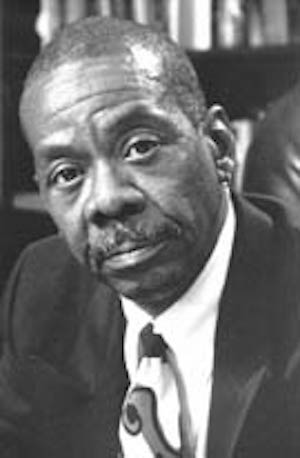Admired by students, faculty and staff, McGee was equally well known in the Bay Area community and across the country. He was frequently invited to numerous conferences to speak on ethnic studies programs at colleges and universities. McGee was a distant relative of the famous historian Carter G. Woodson, who created what was first called Black History Week.

McGee, a professor of black studies, was an authority on blacks in higher education, the psychobiology of melanin, the institutionalization of ethnic studies programs in higher education and Afrocentric education. He also wrote many articles on subjects such as African psychology, academic achievement and black alienation in high school youth, and genetic research and black intelligence.
McGee died exactly one month after San Francisco State University's centennial year commencement where he was awarded the prestigious Presidential Medal for Service by President Corrigan. A plaque, in the Bantu language, given to McGee read: "McGee, the man above the group. McGee, the leader of the house, our royal house. McGee, shining like the sun for his dedication and brilliance. McGee, you have been the man above the group. You have been the leader of our house. You do indeed shine like the sun for your dedication and brilliance, and we thank you." McGee received a standing ovation from the crowd of more than 20,000 spectators.
The scholar came to San Francisco State in 1976, first serving as a lecturer in the Black Studies Department. Two years later, he became acting chairperson of the Black Studies Department and he also served as acting dean of the College of Ethnic Studies. Before arriving at SF State, McGee had been a lecturer in the Department of Psychology at the University of Michigan, an assistant professor of psychology at Stanford University and a faculty member in psychology at Antioch University. He also had been director of training for the National Center on Child Abuse and Neglect.
McGee, a native of El Centro, received his bachelor's degree from California State University, Los Angeles in 1964. He went on to earn his doctorate in psychology from Iowa State University of Science and Technology in 1970.
McGee was a board member of the Institute for the Advanced Study of Black Family Life and Culture, An Ark of Love/AIDS Hospice and Preventive Education, and the Edwin Hawkins Music and Arts Seminar. He also was an advisory board member of the Center for Applied Cultural Studies and Educational Achievement and the Cesar Chavez Public Policy Institute at SF State. He was also active in the arts community, working as a director, choreographer and composer. McGee was an accomplished pianist who worked wit h the gospel choir at Oakland's Love Center Church.
The College of Ethnic Studies was established at San Francisco State University 30 years ago, following the famous student strike that closed the campus for four months in late 1968 and early 1969. Although McGee didn't arrive on the campus until 1976, he recalled the time in an interview with a campus magazine a few months before his death.
"The strikers were very, very ingenious, "McGee said. "They insisted on having their own college, with its own autonomy, one that was not attached, as it would be in most other schools to a college or social sciences or a college of humanities. In the event of budget cuts, those teachers and programs are often among the first to go."
In the mid-1980s, the Academic Senate at SF State turned back a plan that would have lowered the status of the College of Ethnic Studies and in 1990 President Corrigan reaffirmed his support to the College of Ethnic Studies in the wake of allegations it was being threatened.
Under McGee's tenure, SF State's College of Ethnic Studies, the only such college in the country, has grown from less than 200 undergraduate and graduate students taking classes to approximately 10,000 students. More than 200 students are currently pursing undergraduate or graduate degrees in ethnic studies at SF State. More than 80 faculty members teach in the college's departments and students earn bachelor degrees in Asian American Studies, Black Studies and La Raza Studies. And just recently the college developed a Vietnamese American Studies component in its Asian American Studies Department. The college began offering a master's degree in ethnic studies in 1992 and there are plans to offer a master's degree in Asian American Studies.
"SFSU is in the vanguard," said McGee in an interview. "When I came here, the students had won a victory, the curriculum was in place. But many students did not see scholarship in ethnicity. It was enough for them to have a black professor, or an Asian American professor or a Hispanic professor. Now we have begun to realize there is serious scholarship involved in ethnic studies."